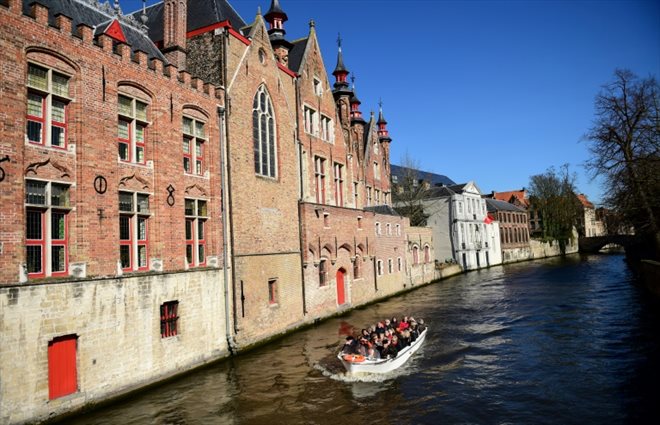Bruges tourist authorities are encouraging tourists to see beyond the center of the city, and visit at offpeak times (AFP/Archives/EMMANUEL DUNAND)
Congested terraces along the canals, crowds thronging the cobbled streets, noria of cruise ships… the small Flemish town of Bruges is looking for a way out of the mass attendance that exasperates its inhabitants, by encouraging quality tourism with longer stays.
“We’ve reached a red line. We don’t need more tourists, we’ve had enough. We might even need a little less,” laments Arnout Goegebuer, a 55-year-old architect from Bruges who took refuge inside. of a coffee.
Bruges, the jewel of western Belgium classified as a UNESCO World Heritage Site and nicknamed the “Venice of the North”, has 119,000 residents and welcomes eight million visitors each year, most of them in summer and for a stay not generally not exceeding one day.
For the city, the goal is not to know the fate of Venice, Unesco having threatened last month to place the Italian city on its list of world heritage in danger due to extreme overtourism.
For the inhabitants of Bruges interviewed by AFP, the reception capacities of the historic center are already largely exceeded in the summer period.
If they recognize the positive effects for the economy and employment, they denounce an unbalanced tourism which transforms their city into an open-air museum: “There are many problems. The inhabitants of Bruges say that it is too much, much too much certain days”, laments Kurt Van Der Pieter, a 62-year-old retiree who has always lived there.
The number of tourists has returned to pre-Covid-19 pandemic levels, thanks in particular to cruise ships docking in the nearby port of Zeebrugge, whose passengers only spend a few hours there.
– Accommodation under tension –
This fed up with the locals is echoed in a ranking established in August 2022 by the rental site Holidu, a competitor of Airbnb, which listed the most frequented European destinations in number of tourists compared to inhabitants.
Venice, Bruges and the Greek island of Rhodes tied for second, behind the Croatian fortified city of Dubrovnik — overwhelmed by “Game of Thrones” fans and become a symbol of overtourism.
The Bruges tourist office, “VisitBruges”, disputes this ranking, saying that according to mobile phone data there are on average only 131 visitors per day per 100 inhabitants.
“Bruges is often described as a destination for mass tourism, but this is not the case. It is a misconception to speak of an overcrowded city”, insists to AFP a spokesperson, Ann Plovie.
“We can’t deny that there are a lot of tourists, but you have to come at different times, you will see the difference”, agrees his colleague Anne De Meerleer.
The municipality has nevertheless taken note of the problematic surge of visitors during the summer, adopting a five-year strategy in 2019 to encourage visitors to stay several nights, explore the surrounding region, and try cultural and gastronomic experiences beyond beyond selfies and a quickly swallowed waffle…
“The goal is not to attract more visitors: it’s not the volume that counts, but the type of visitors we receive,” says Ms. De Meerleer, guiding a visitor to picturesque corners of the old centre, magnificent but almost empty… a few streets from the unmissable Grand-Place.
After the collapse of tourism in 2021-2022 during the pandemic, the city center of Bruges is once again experiencing serious tensions over tourist accommodation, especially since buildings can no longer be converted into hotels to avoid crowding out the inhabitants.
Unlike other European tourist cities, Bruges has not closed off access to the historic center for cars, although the train station is a few minutes away: in the streets, license plates are a kaleidoscope of all of Europe .
“I didn’t think there would be so many people,” observes Lee Hotae, a South Korean tourist, admiring an ancient facade during a guided tour. Ross Henderson, a 43-year-old Scottish visitor, puts it into perspective: “It’s not that crowded. It’s like visiting a place as beautiful as Amsterdam, Florence or Venice, but less crowded”.
Diego Rodriguez, a 41-year-old Venezuelan, finds the attendance acceptable “especially since we are during the summer holidays”. He had discovered the city last spring “much emptier: it was colder, and people were not on vacation”.
© 2023 AFP
Did you like this article ? Share it with your friends with the buttons below.




